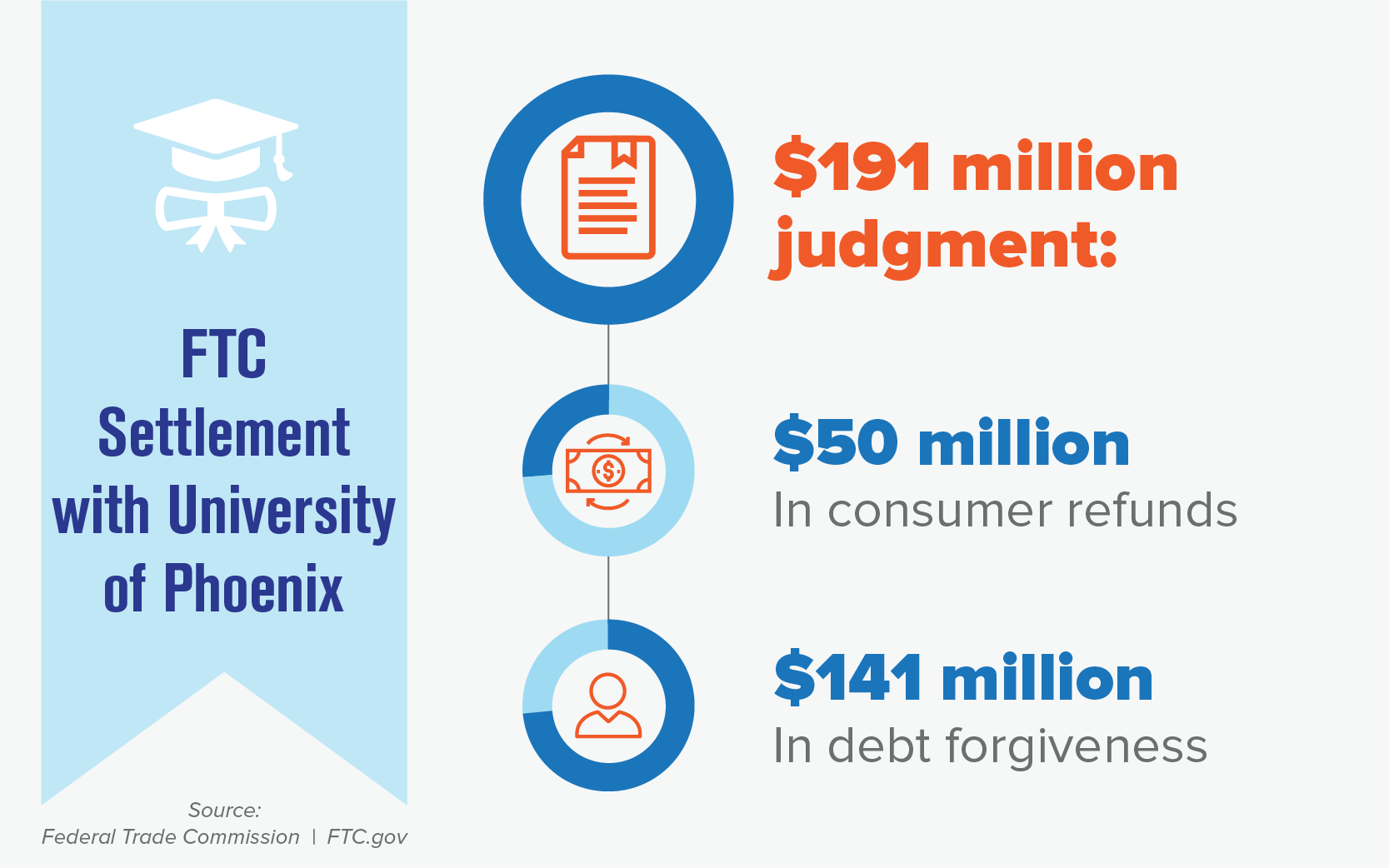Most people go to college to earn a degree and get a good job. In a competitive job market, it helps to have connections. So when a college or university claims it has relationships with well-known employers, that may convince you to attend. But beware: Claims like this may be a ploy to attract new students — and your tuition dollars. In fact, the FTC says that’s just what one for-profit university did as part of an extensive advertising campaign.
In a proposed settlement announced today, the FTC says that for-profit University of Phoenix, and its parent company, Apollo Education Group, Inc., falsely claimed that their relationships with top companies created job opportunities specifically for Phoenix students and deceptively claimed they worked with these companies to develop courses.

The FTC says that University of Phoenix used a multi-media ad campaign to attract students, including ads specifically targeted to military and Hispanic consumers. The companies’ “Let’s Get to Work” campaign featured several high-profile employers, including Microsoft, Twitter, Adobe, and Yahoo!, giving the false impression that UOP worked with those companies to create job opportunities for its students.
As part of the $191 million settlement, the companies will return $50 million in cash to former students and cancel $141 million in student debt owed directly to the school. The proposed order prohibits the companies from further deceptive business practices. In addition, it requires them to ask consumer reporting agencies to delete the debts from people’s credit reports, give notice to those who got debt cancellation, and make sure people have access to their diplomas and transcripts.
Before enrolling in school, it’s important to do your homework. You can get important information about any school at the U.S. Department of Education’s College Navigator. For example, if you enter a school’s name, you can find out if it’s public or private, for-profit or non-profit, its accreditation status, and its student loan default rates.
Also, check out what are people are saying about schools you’re considering. Search online for the school’s name plus words like “review,” “complaint” or “scam.”
If you’re looking to advance your education, do your homework to be sure you know what you’re paying for. Check out Choosing a College: Questions to Ask.
Added on December 19, 2019: The FTC will identify people who are eligible for a payment from the $50 million University of Phoenix settlement with the FTC. You don’t have to apply or submit a claim to get a payment. If you would like to get email updates about this settlement, please sign up here.

In reply to Hello all, by brock007
In reply to Hello, by Yaylan't use y…
In reply to I also applied for Borrower's by Melody S
In reply to Hello, by Yaylan't use y…
In reply to Why can't I view the link to by Brock
There are links to the case documents and press release on this page.
In reply to There are links to the case by FTC Staff
In reply to I also attended University of by Yaylan't use y…
In reply to Looks like the FTC v Devry by romaniq
The US Department of Education is responsible for the Borrowers Defense to Loan Repayment Forgiveness process. You can contact the US Department of Education for information about the process and an application.
In reply to It’s July 2020 and no one has by Hurleystacey
Under the settlement between the FTC and the University of Phoenix, the University cancelled $141 million in debts that are owed directly to the school by people who first enrolled at the school between October 1, 2012 and December 31, 2016.
The FTC will identify people who are eligible for a payment from the $50 million the University paid to the FTC as part of the settlement. You don’t have to apply or submit a claim to get a payment. If you would like to get email updates about this settlement, please sign up here.
In reply to Regarding FTC Staff, by Brock
The press release that announced the settlement says borrowers who want to lower their monthly payments on federal loans can get free information from the United States Department of Education about income-driven repayment plans. People who believe they have been defrauded or deceived can apply for loan forgiveness through the Borrower Defense to Repayment procedures.
The US Department of Education is responsible for the Borrowers Defense to Loan Repayment Forgiveness process. You can contact the US Department of Education for information about the process and an application.
In reply to received an email regarding by rharmsen
The FTC is not sending people email or asking them to fill out claim forms related to its settlement against the University of Phoenix.
In reply to I just received this email by Marcy264
The University of Phoenix (UoP) sent “FERPA” notices to some students in July. If you got a notice, and you agree that UoP can give the FTC your identifying and contact information so you can be considered for a refund, you don’t have to do anything. If you got a notice and you don’t want UoP to give the FTC your identifying and contact information, you can object by August 24, 2020. The FERPA notice tells you how to object. If the FTC doesn’t get your identifying and contact information, it can’t consider you for a refund.
In reply to The University of Phoenix by FTC Staff
Pagination